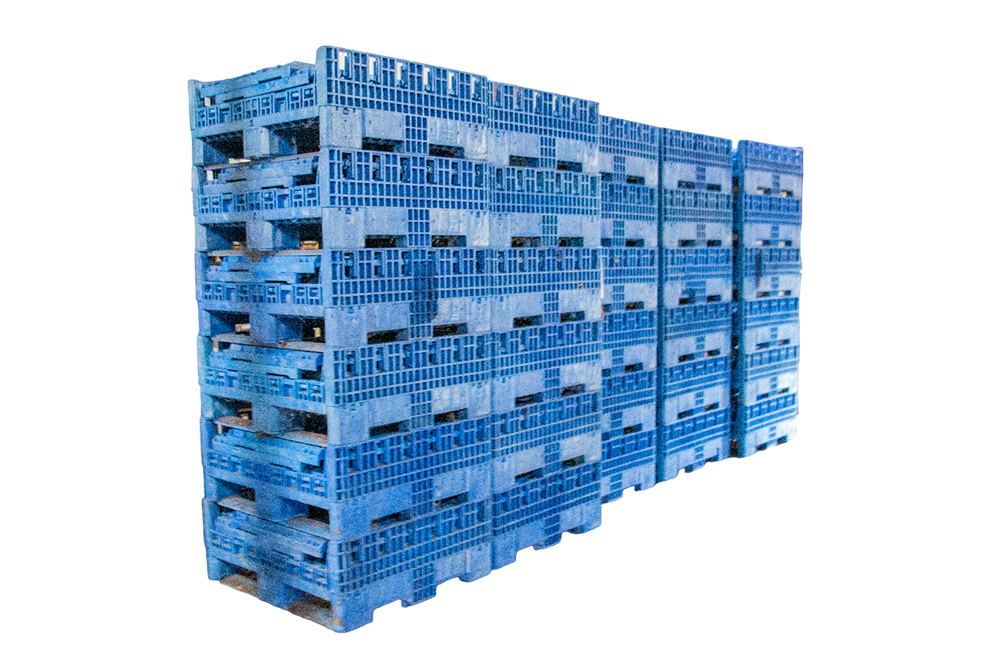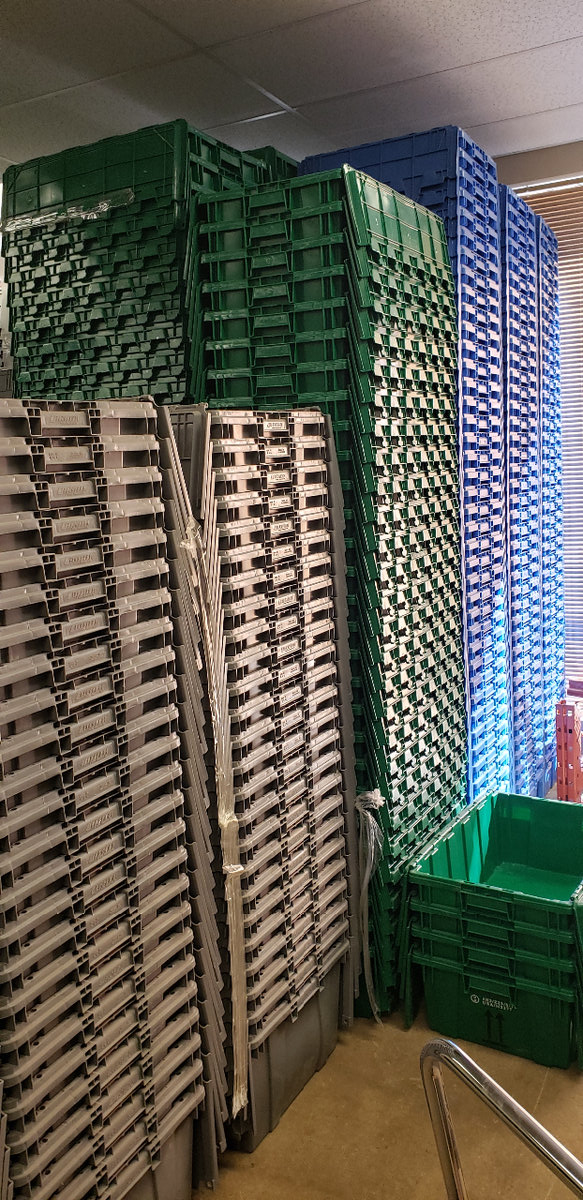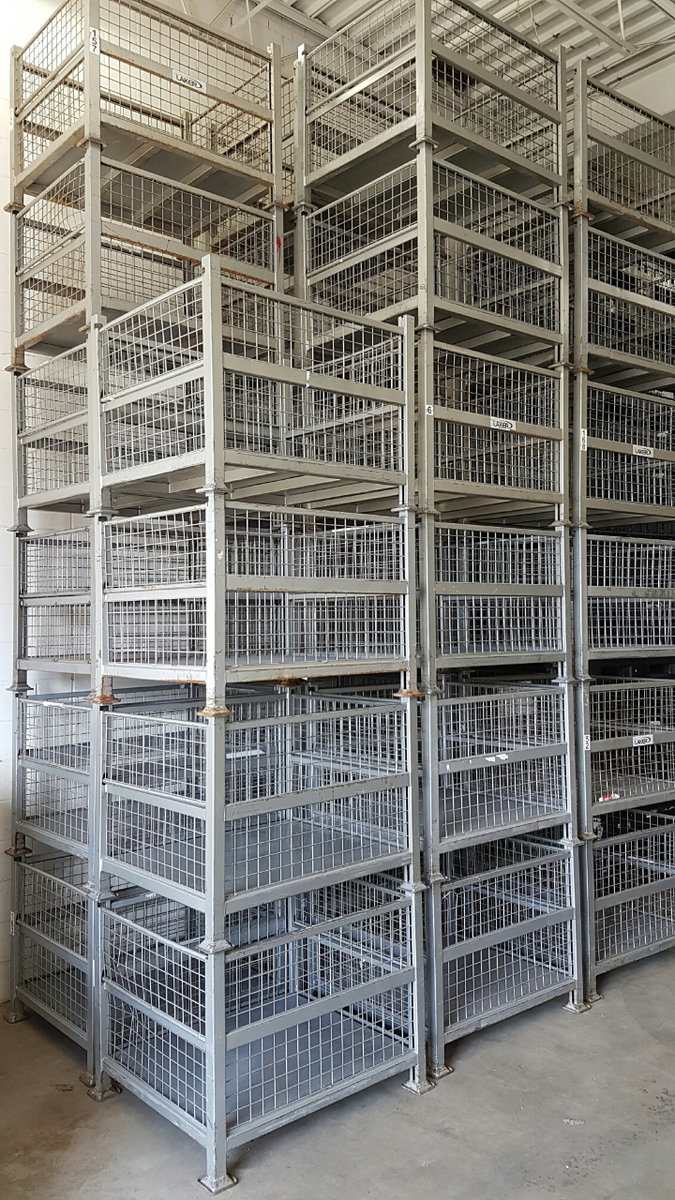The smart choice for businesses: used collapsible bulk containers for flexible storage
Why Bulk Containers Are Vital for Cost-Effective and lasting Transportation
Mass containers play an essential role in modern logistics. They promote the efficient movement of huge quantities of products, consequently maximizing transportation procedures. This approach not just lowers prices however also lessens ecological effect with lower emissions and waste generation. As industries look for even more lasting methods, the adoption of bulk containers is coming to be significantly substantial. What effects does this change hold for future logistics and supply chain monitoring?

The Benefits of Utilizing Mass Containers in Logistics
Bulk containers transform logistics by boosting performance and sustainability. These containers allow for the transportation of big amounts of goods in a single trip, significantly minimizing the number of trips required. This not only streamlines procedures but also reduces labor costs connected with handling, loading, and dumping. Additionally, mass containers are created to optimize room utilization within transportation lorries, making sure that more products can be delivered at the same time.
The standardization of bulk containers likewise simplifies the logistics process. With consistent measurements, they can be conveniently stacked and stored, resulting in enhanced storage facility management. Moreover, mass containers usually include long lasting materials that protect materials from damages during transit, thereby lowering item loss and boosting total integrity. As a result, services can experience enhanced supply chain performance, eventually resulting in increased productivity and customer complete satisfaction. This mix of factors makes mass containers an important asset in modern-day logistics.
Environmental Impact: Lowering Waste and Carbon Footprint
As sectors progressively focus on sustainability, the adoption of mass containers has actually become a crucial strategy for minimizing waste and decreasing carbon footprints. These containers lessen using packaging materials, such as boxes and plastic, consequently especially reducing total waste generation. By consolidating shipments, mass containers boost transportation effectiveness, allowing for even more items to be carried per journey. This decrease in journeys directly correlates with lower greenhouse gas discharges, adding to a smaller sized carbon impact.
Furthermore, mass containers can frequently be recycled or reused, further reducing environmental impact. The sturdiness of these containers warranties they can withstand multiple transport cycles, decreasing the requirement for single-use choices. used bulk containers. By enhancing logistics and promoting effective resource use, bulk containers not just sustain lasting methods however likewise motivate industries to align with international ecological objectives. Eventually, their application reflects a dedication to environmental stewardship and accountable source administration
Expense Cost Savings: Exactly How Bulk Containers Lower Transport Expenditures
While several business seek ways to enhance their profits, using bulk containers presents a substantial opportunity for reducing transport costs. Bulk containers make the most of the volume of items carried, permitting companies to ship larger amounts at as soon as. This efficiency minimizes the number of journeys called for, straight lowering fuel costs and reducing labor expenditures connected with loading and discharging.
Additionally, mass containers commonly feature streamlined layouts that enhance space usage within transportation automobiles. This implies less voids, causing more reliable usage of available capability. The resilience of mass containers can decrease the risk of product damages throughout transportation, ensuring and decreasing losses that even more items arrive intact.
Enhancing Supply Chain Effectiveness With Mass Storage Solutions
Mass storage space solutions play a necessary duty in enhancing supply chain efficiency by enhancing supply administration. By settling items into fewer, larger containers, services can substantially lower handling costs connected with frequent transfers and processing. This streamlined technique enables far better monitoring and monitoring of supply, eventually causing enhanced operational efficiency.
Structured Inventory Administration
Efficient stock monitoring is essential for optimizing supply chain operations, particularly when organizations take on bulk storage space remedies. These remedies make it possible for businesses to keep greater supply degrees while decreasing the regularity of replenishment. By settling products right into bulk containers, companies can simplify their stock processes, decreasing the intricacy connected with tracking multiple smaller sized plans. This method assists in exact stock matters and boosts projecting precision, permitting even more informed decision-making. In enhancement, bulk storage services simplify storage facility organization, making it easier to situate and gain access to products when required. As a result, organizations can attain a more efficient supply turnover price, inevitably improving total supply chain efficiency and decreasing the chance of stockouts or overstock circumstances.

Minimized Handling Prices
The implementation of bulk storage space remedies not only streamlines inventory management but also considerably minimizes taking care of costs throughout the supply chain. By settling products into bulk containers, business decrease the need for frequent handling and transfer between various storage space and transport units. This method reduces labor prices connected with loading, unloading, and moving smaller bundles. In addition, mass storage space decreases the frequency of deliveries, causing reduced transport prices and lowered fuel consumption. Therefore, services can enhance their logistics procedures, permitting for an extra reliable appropriation of sources. Inevitably, decreased managing expenses contribute to improved general supply chain efficiency, fostering an environment that sustains both sustainability and financial feasibility.

Flexibility of Mass Containers Throughout Various Industries
Many industries have unique demands for transportation and storage, bulk containers have emerged as a flexible option that fulfills a large range of demands. These containers, varying from big bins to specialized containers, can fit diverse products, consisting of liquids, granules, and powders. In the agricultural market, bulk containers help with the transportation of grains and fertilizers, while the food and beverage market utilizes them for components and finished products. The chemical industry depends on mass containers for safely transporting unsafe products, ensuring compliance with safety policies. In addition, building companies gain from bulk containers for carrying aggregates and other materials. Their flexibility expands to numerous settings of transportation, consisting of trains, ships, and trucks, enhancing logistical performance. This adaptability not just simplifies procedures across various markets but additionally advertises sustainability by decreasing product packaging waste and enhancing room en route. Bulk containers play an important duty in contemporary supply chain management.
Future Trends wholesale Container Usage and Sustainability
The future of mass container use is progressively formed by ingenious products development that boosts sustainability. Additionally, automation in logistics guarantees to improve procedures, decreasing waste and boosting effectiveness. Embracing round economic climate practices will certainly further change how bulk containers are created, used, and reused, fostering an extra sustainable transport landscape.
Innovative Products Development
As markets significantly prioritize sustainability, innovative products advancement wholesale containers arises as a significant aspect in boosting environmentally friendly transport remedies. Makers and scientists are discovering eco-friendly plastics, recycled composites, and lightweight metals to decrease environmental effect. These products not just reduce waste however likewise enhance gas performance by lowering the total weight of containers. Additionally, improvements in clever products, which can adjust to varying problems, enhance the durability and performance of mass containers. The integration of these innovative materials aligns with circular economic climate principles, promoting reuse and recycling. As the demand for lasting methods expands, the growth of such products will play a vital duty fit the future of mass container usage in logistics and transport.
Automation in Logistics
Significant innovations in automation are poised to change logistics and the use of mass containers, boosting sustainability in transport. Automated systems, consisting of drones and autonomous automobiles, are simplifying the motion of bulk containers, decreasing the reliance on typical fuel-powered transportation. These innovations optimize transmitting and packing procedures, enhancing and reducing empty miles gas performance. Furthermore, automated stock management systems enhance monitoring and surveillance of mass containers, making certain much better resource allocation and reduced waste. The assimilation of the Web of Things (IoT) allows real-time information analysis, enabling positive decision-making that aligns with sustainability goals. As automation remains to progress, it is expected to drive additionally advancements in bulk container usage, inevitably supporting more sustainable logistics practices and minimizing the ecological effect of transport.
Circular Economy Practices
Improvements in automation are establishing the stage for a much more incorporated method to round economy practices in the domain name of bulk container use. As markets significantly accept sustainability, mass containers are being created for longevity and reusability. This change not just decreases waste but additionally enhances resource performance. Companies are taking on strategies such as closed-loop systems, where utilized containers are collected, reconditioned, and reintroduced right into the supply chain. Additionally, clever technologies track container life process, facilitating much better monitoring and decreasing ecological impact. The partnership in between producers, logistics companies, and end-users is crucial in establishing requirements for sustainable container use. used collapsible containers. Future fads indicate an expanding emphasis on materials that are naturally degradable and recyclable, additional strengthening the circular economy's principles wholesale transport

Often Asked Inquiries
What Products Are Bulk Containers Usually Made From?
Mass containers are typically built from sturdy products such as high-density polyethylene, steel, aluminum, and cardboard. These materials supply defense, toughness, and versatility, making them ideal for moving various items in different markets successfully.
How Do I Pick the Right Size Bulk Container?
Selecting the appropriate size bulk container includes examining the volume of products to be transferred, considering handling tools compatibility, and assessing storage space needs. Proper dimension guarantees efficiency in transport and lessens waste throughout shipment.
Are Mass Containers Reusable or Recyclable?
Mass containers are usually multiple-use, created for several trips, enhancing sustainability. Several can likewise be recycled, depending on the materials utilized. Selecting recyclable choices additionally sustains environmental goals and lowers waste in transportation practices.
What Safety Regulations Apply to Bulk Container Transportation?
Security policies for bulk container transportation consist of conformity with the Division of Transport guidelines, proper labeling of hazardous materials, architectural integrity analyses, and adherence to weight restrictions to guarantee secure handling and stop crashes during transportation.
Exactly How Can Organizations Shift to Making Use Of Bulk Containers Properly?
Businesses can transform to bulk containers by examining current logistics, training team on handling, investing in appropriate tools, used collapsible bulk containers optimizing stock monitoring, and collaborating with vendors to assure compatibility and efficiency throughout the supply chain.
As sectors progressively focus on sustainability, the fostering of bulk containers has actually emerged as a vital method for reducing waste and decreasing carbon footprints. By settling materials into mass containers, firms can enhance their supply processes, decreasing the complexity connected with tracking numerous smaller sized packages. As industries increasingly prioritize sustainability, ingenious products growth in bulk containers arises as a considerable factor in improving environmentally friendly transport solutions. Automated systems, consisting of drones and autonomous cars, are simplifying the movement of bulk containers, lowering the reliance on standard fuel-powered transportation. Additionally, automated stock monitoring systems enhance tracking and surveillance of mass containers, making certain much better resource allotment and decreased waste.